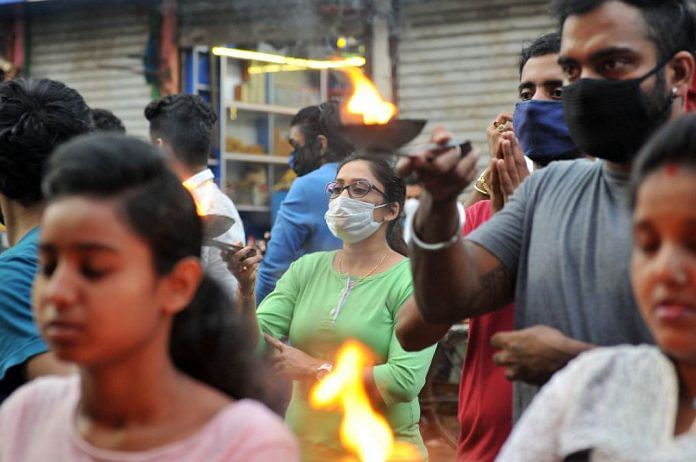New Delhi: No touching of idols at temples, crowd and queue management at shopping mall food courts, and, preferably, disposable napkins and menu cards at restaurants. Movie outings will have to wait for now.
The Union health ministry Thursday issued the standard operating protocol for lockdown relaxations that will kick in 8 June as part of the government’s ‘Unlock 1’ plan.
The guidelines offer preventive measures to be followed at offices, religious places, restaurants, shopping malls and hotels. They set the ground rules work for the gradual adoption of a new normal, underlined by social-distancing norms, as India tries to balance its struggle against Covid-19 with the resumption of economic and other activities.
Under Phase 1 of the ‘Unlock’ exercise, announced last Sunday, the government allowed religious places, hotels, restaurants and shopping malls to reopen from 8 June. The SOP announced Thursday outlines specific precautionary measures such as only allowing the entry of asymptomatic individuals and the presence of sanitising stations on the premises.
Also Read: Strike balance between rights of staff and employers, both hit by lockdown: SC to govt
Offices
Offices were allowed to run with 100 per cent attendance in the fourth phase of the lockdown, which lasted from 17 May to 31 May, but the government had advised ‘work from home’ as much as possible.
In the new guidelines, the health ministry has advised work from home for people aged above 65 years, besides pregnant women and those with comorbidities.
They state that entrance to offices should mandatorily have hand sanitising stations and thermal screening, and that only asymptomatic staff and visitors should be allowed in. Staff residing in containment zones should not be allowed to attend office until these zones are denotified as such, they add.
In case an employee or employees are found to be suffering from symptoms, they should be isolated in a room and the nearest medical facility informed.
Public health authorities should then undertake “a risk assessment”, which will include contact-tracing and studying the need for disinfection. In case of a large outbreak, the building or block will have to be closed for 48 hours for disinfection.
Religious places
Only religious places outside containment zones will be allowed to open. “Persons above 65 years of age, persons with comorbidities, pregnant woman and children below the age of 10 years are advised to stay at home,” the SOP states.
The entrance should have sanitising stations and thermal screening, and, again, only asymptomatic people should be allowed in.
Footwear will have to be taken off inside your vehicle, or, if needed, kept in separate slots assigned to each individual or family.
Posters should be put up and audio and videos messages played to spread further awareness about preventive measures. Touching of idols, holy books and statues will not be allowed, and distances will have to be maintained in queues through markings.
According to the guidelines, “as far as feasible”, recorded devotional music may be played, but choirs will not be allowed. Physical offerings like holy water will not be permitted and devotees have to bring their own prayer mats.
Also Read: Indians are getting complacent about Covid-19 — just what the virus wants
Restaurants
The government has advised takeaways instead of dine-in services. However, should a restaurant offer dine-in services, they must realign seating in keeping with social-distancing norms. Seating should be restricted to not more than 50 per cent of the restaurant’s capacity.
Disposable menus and paper napkins have also been advised, and there have to be separate entry points and exits for staff, patrons as well as supplies.
Waiters, valets and other staff would have to wear masks and gloves.
Shopping malls
Cinema halls, gaming arcades and the reserved areas for children will remain closed. The mall management will have to ensure crowd and queue management at food courts. “In food courts and restaurants, not more than 50 per cent of seating capacity to be permitted,” the SOP states.
The number of customers in shops will have to be minimal to prevent crowding. The government has also advised “staggering of visitors… if possible”.
Hotels
Hotels are required to adopt contactless processes like QR code, online forms and digital payments at the time of check-in and check-out. Guests will have to provide details of their travel history and medical conditions, along with an ID and self-declaration form.
Guests’ luggage will have to be disinfected before it is sent to rooms, and room service and takeaways are encouraged over meals in dining spaces.
Also Read: Fruits and aloo-puri from Delhi Police — how beggars survived the Covid lockdown



